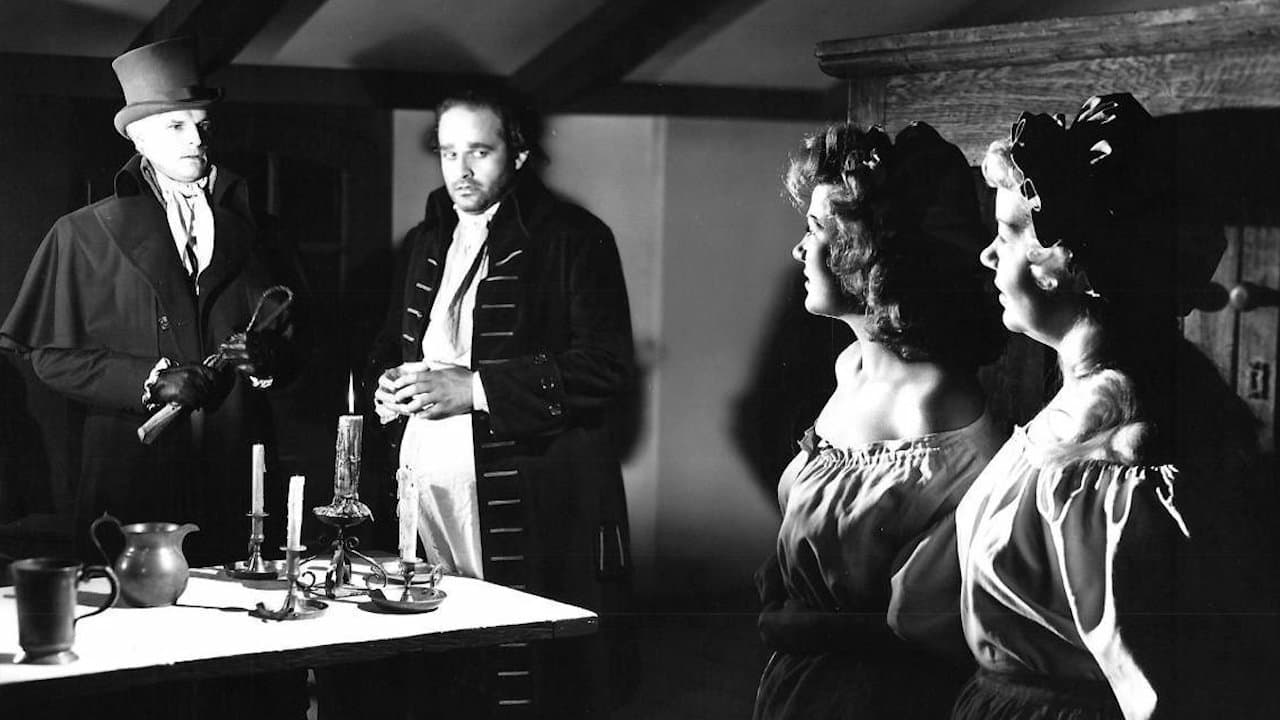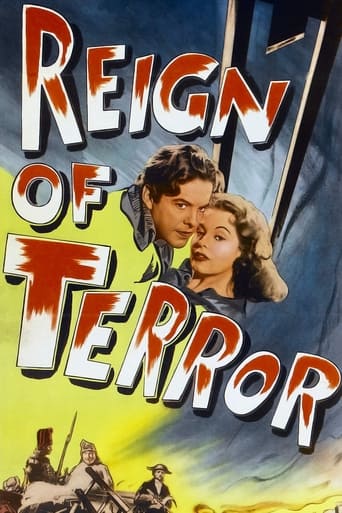



Really Surprised!
Fantastic!
A Disappointing Continuation
It’s fine. It's literally the definition of a fine movie. You’ve seen it before, you know every beat and outcome before the characters even do. Only question is how much escapism you’re looking for.
View MoreDirected by Anthony Mann, with a screenplay by Aeneas MacKenzie and Philip Yordan, this noirish fictionalized historical drama focuses on the time period just after the French Revolution dubbed the 'reign of terror, when silver-tongued Maximilian Robespierre (played by Richard Basehart) used the people's confusion and nearly became France's new dictator.Robert Cummings plays Charles D'Aubigny, who impersonates a foreign executioner named Duval that was summoned to do some necessary dirty work by Robespierre. D'Aubigny must navigate the cloak and dagger environment to help François Barras (Richard Hart) and the people avoid the travesty of Robespierre's plans. Arlene Dahl plays Madelon, a Barras ally who knew D'Aubigny previously (and romantically), which is (at times) both an asset and a liability for the country's 'savior'.Arnold Moss play Fouché, the untrustworthy head of Robespierre's secret police, who has his own agenda and desire for a power grab. Norman Lloyd plays Tallien, Madelon's protector; Charles McGraw plays Sergeant. Jess Barker plays Saint Just, who faithfully carries out Robespierre's wishes and rightfully suspects that D'Aubigny isn't who he says he is. Beulah Bondi plays Grandma Blanchard, the matriarch at the farm where D'Aubigny and Madelon temporarily receive refuge while hiding from St. Just; a very young Russ Tamblyn appears uncredited as one of the Blanchard children.The film begins with Robespierre having his previously trusted friend Danton (Wade Crosby, uncredited) sentenced and convicted as an enemy of the people, to give one a sense of how crazy the post- revolution environment has become (and the power of Maximilien as accuser). Shortly thereafter, Duval (Charles Gordon, uncredited) is killed by a mysterious man that turns out to be D'Aubigny, who'd received a ring from the exiled General, the Marquis de Lafayette (Wilton Graff, uncredited) to prove his true loyalty to the people, and Barras.Near the end of the film, a brief reference is made to France's future when Fouché speaks to a soldier claiming to be Napoleon Bonaparte.
View MoreI'd love to be able to give this film a higher rating, because I'm sure it's excellent. Unfortunately, the disc I have of this is a very poor print, and the dialogue was so fuzzy I missed a lot of it."Reign of Terror" is a 1949 film directed by Anthony Mann and stars Robert Cummings and Arlene Dahl.The time is May 1794. Robespierre (Richard Basehart) wants to become dictator of France. Supposedly he has a black book containing the names of his enemies, all of which he plans on destroying. The book is missing. He brings in a man named Duval to help find it. Duval, however, has been replaced by Charles D'Aubigny, a patriot who wants to bring down Robespierre.This filmed moved quickly, and Cummings and Dahl certainly made an attractive couple. She was one of the most beautiful women in Hollywood - you can even see that through a lousy print. Cummings would go on to huge success in television; as a film star, he was a second stringer at best, always likable, but probably better suited to comedy. However, under Mann's direction, he does a good job.Basehart is wonderful as Robespierre, and Arnold Moss, who looks like he could have been Adrien Brody's father, is an effective Fouche, who became later the head of Napoleon's secret police.France continued to have a tough time after the monarchy was brought down. Robespierre was a complicated person with high ideals, but he used terrorism to achieve them.
View MoreIn one scene a character lights a candle using a match. Unfortunately, at the time of the French revolution (1789ish), flint and steel with a tinder box and sulphur-tipped tapers--- called "spunks"--- were the usual means of obtaining fire.Sparks, made by striking the flint and steel, were made to fall upon the tinder (usually charred cotton or linen) which then took on enough of a glow to ignite the sulphur on the spunk.In 1805, a chap named Chancel, an assistant to Professor L.J. Thenard of Paris, came up with a process of dipping a stick coated with sulphur and tipped with a mixture of potassium chlorate and sugar, into a bottle containing asbestos fibres soaked with sulphuric acid. The sulphuric acid reacted with the potassium chlorate to produce a flame.The first practical friction matches --- the "Congreves" , named after Sir William COngreve, the inventor of the Congreve rocket, were invented in England in 1827 by John Walker, a druggist of Stockton-on-Tees. These consisted of a stick coated with sulphur and tipped with antimony sulphide, potassium chlorate and gum. With each box (which sold for a shilling, a not insubstantial sum at the time) came a piece of glass-coated paper. To light the Congreve you folded the paper and drew the stick between the folds.Sorry for the long diversion, but there is a, to my mind, rather silly requirement that at least ten lines be submitted. I wonder what Julius "Veni, Vidi, Vici" Caesar would have said to that.
View MoreROBERT CUMMINGS and ARLENE DAHL are improbably cast in a grim tale of the French Revolution during the famous reign of terror following the storming of the Bastille. RICHARD BASEHART plays the treacherous keeper of "The Black Book", Robspierre, seen in powdered wig, a man with a twisted mind and soul, who declares that "the Revolution has abolished God." JESS BARKER is an equally treacherous henchman, a soldier of the Republic assigned to find the man who stole the infamous book listing the names of the enemies of France.The low-key B&W photography hides most of the sets in deep shadows, giving the impression that it covers the low-budget production values and at the same time gives the story a film noir ambiance.Cummings and Barker, usually cast in more lightweight material, are fine in some sketchily written roles and Dahl is her usual attractive self, little more, as a woman of mystery.RUSS TAMBLYN has a minor early role and BEULAH BONDI has a small part as a woman who knows the whereabouts of the Black Book.It ends, of course, with the downfall of the evil Robspierre and his cohorts.Summing up: Fairly interesting, but Arlene Dahl's make-up and hairdo is strictly from a modern era. She never quite fits the mold of a period costume heroine, more like an anachronism in an otherwise convincing French Revolution setting.
View More